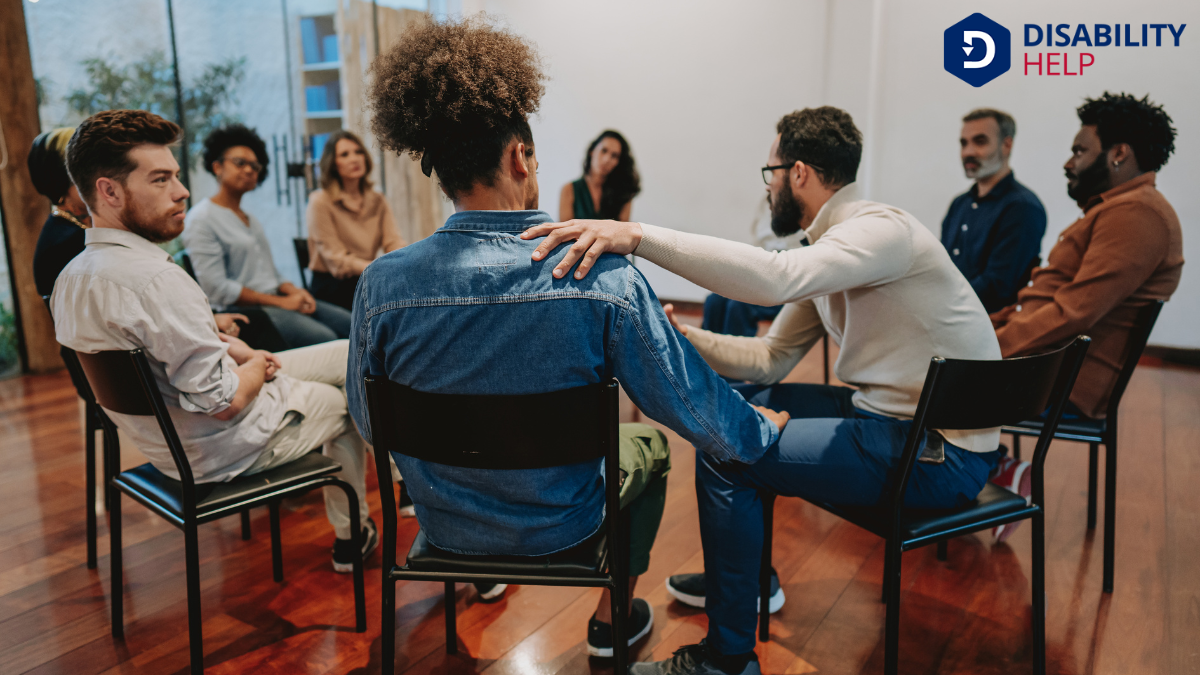We offer a range of training programs for workers with disabilities, focusing on accessibilityThe design of products, devices, services, or environments to be usable by people with disabilities...., inclusivity, and skill enhancement. Our online learning platforms provide flexible access, while tailored vocational training aligns with individual strengths. Our programs integrate assistive technology, enhancing learning experiences. Mentorship and government-sponsored initiatives empower skill development and self-advocacyThe act of representing oneself and one’s interests, particularly by individuals with disabilities.... By exploring our extensive resources, you'll discover paths to achieving greater employment opportunities and personal growth.
Key Takeaways
- Online learning programs provide flexible, self-paced courses accessible from any location, catering to workers with disabilities.
- Vocational training programs offer customized skill development, tailored to individual strengths and needs for effective learning experiences.
- Assistive technology in training includes screen readers, voice recognition, and adaptive devices to enhance accessibility for disabled workers.
- Mentorship programsPrograms that pair individuals with disabilities with experienced professionals to provide guidance ... offer guidance and networking opportunities with seasoned professionals to support career developmentThe process of managing life, learning, and work over the lifespan, including for individuals with d... and connection building.
- Government-sponsored initiatives, like the Workforce Innovation and Opportunity Act, provide funding and training resources for workers with disabilities.
Online Learning Platforms for Accessibility
When it comes to enhancing accessibility for workers with disabilities, online learning platforms are a game-changer.
They break down barriers by offering flexible, self-paced learning. We can access courses from anywhere, which means no need for physical travel.
These platforms often include features like screen readers, captions, and adjustable text sizes, making content accessible to everyone.
Inclusive Workshops and Seminars

Although online platforms offer significant advantages, inclusive workshops and seminars also play an essential role in training programs for workers with disabilities.
These in-person gatherings provide a unique opportunity for us to engage directly, fostering a sense of community and shared learning. We can benefit from real-time interactions with experts and peers, which allows for immediate feedback and personalized support.
Workshops and seminars often address practical skills and challenges specific to our diverse needs, ensuring that we leave with actionable insights. By attending these events, we not only gain knowledge but also build networks that support our professional growth.
Let's embrace the chance to learn collaboratively, as these inclusive environments empower us to thrive in our respective workplaces.
Tailored Vocational Training Programs
Let's explore how tailored vocational training programs can make a significant difference for workers with disabilities.
By focusing on customized skill development, we guarantee that each individual's unique strengths and needs are addressed.
Additionally, adaptive learning techniques allow us to create flexible training environments that foster personal growth and success.
Customized Skill Development
Recognizing the unique needs of individuals with disabilities, we can enhance their opportunities through customized skill development. By crafting individualized training programs, we cater to specific strengths and challenges, ensuring a more effective learning experience.
These programs focus on practical skills required in various industries, allowing participants to thrive in their chosen fields. We collaborate closely with employers and educational institutions to design courses that align with job market demands.
Through this approach, participants acquire relevant skills that boost their employability. Additionally, ongoing support and mentorship play an essential role in fostering confidence and competence among trainees.
Adaptive Learning Techniques
To effectively support diverse learning needs, we implement adaptive learning techniques in our vocational training programs. These techniques allow us to tailor our approach based on individual preferences and abilities, ensuring everyone receives the support they need.
By using technology and personalized strategies, we adjust the pace, style, and content of instruction to match each learner’s unique requirements.
We recognize that learning isn’t one-size-fits-all. Some may benefit from visual aids, while others might prefer hands-on experiences. Our goal is to create an inclusive environment where everyone can thrive.
We continually assess progress and make necessary adjustments, fostering growth and confidence. By focusing on adaptability, we empower workers with disabilities to build skills and succeed in their chosen careers.
Assistive Technology in Training
Although technology continues to revolutionize our daily lives, its impact is particularly transformative in training programs for workers with disabilities.
We see how assistive technology breaks down barriers and fosters inclusivity. Let's explore how this unfolds:
- Screen Readers: These tools convert text to speech, enabling visually impaired individuals to access written content effortlessly.
- Voice Recognition Software: By converting spoken words into text, this assists those with mobility challenges in maneuvering through digital spaces.
- Adaptive Keyboards and Mice: Designed for ease of use, these peripherals accommodate various physical needs, ensuring everyone can interact with computers comfortably.
- Augmentative and Alternative Communication (AAC) Devices: These devices support individuals with speech impairments, offering alternative ways to communicate effectively.
Mentorship Opportunities for Skill Development

When we think about skill development for workers with disabilities, mentorship stands out as a powerful tool. It offers personalized guidance, helping individuals navigate career paths and hone their skills. By matching workers with experienced mentors, we create a supportive environment where learning is tailored to specific needs and aspirations.
Mentors share invaluable insights, foster confidence, and open doors to professional networks that might otherwise be inaccessible. In this collaborative relationship, both parties benefit. Mentors gain fresh perspectives and mentees acquire skills and knowledge critical for career advancement.
We can all appreciate how this mutual exchange enriches both the workplace and personal growth. Through mentorship, workers with disabilities not only develop skills but also cultivate a sense of belonging and empowermentThe process of gaining control, authority, and power over one’s life, often used in the context of....
Government-Sponsored Training Initiatives
Government-sponsored training initiatives play an essential role in enhancing employment opportunities for workers with disabilities.
These programs provide us with access to the necessary skills and knowledge, ensuring we can thrive in the workforce. By leveraging these resources, workers with disabilities can overcome barriers and achieve meaningful employment.
Here are four key government-sponsored initiatives we should consider:
- Vocational RehabilitationServices that help individuals with disabilities prepare for, obtain, and maintain employment. Services: These services offer personalized assistance, focusing on job training and placement for individuals with disabilities.
- Workforce Innovation and Opportunity Act (WIOA): This act provides funding for job training programs that focus on skill development and job readiness.
- Ticket to Work ProgramA U.S. Social Security Administration program that provides free employment services to help individ...: Aimed at Social Security recipients, this initiative supports their return to work through training and employment services.
- Apprenticeship Programs: These offer hands-on experience and mentorship in various industries.
Corporate Training Programs for Inclusivity
Corporate training programs for inclusivity are vital in creating a diverse and welcoming workplace environment. We need to understand that these programs aren't just a formality but a significant step in fostering equality and respect.
By implementing training focused on inclusivity, companies can guarantee that all employees, including those with disabilities, feel valued and empowered.
These programs often include workshops on unconscious bias, accessibility practices, and effective communication strategies. By actively participating in these training sessions, we can challenge assumptions and promote understanding.
It's important for leadership to support and endorse these initiatives, setting a positive example. We must remember, creating an inclusive workplace isn't just the right thing to do—it's a strategic advantage in today’s competitive market.
Community-Based Support and Training

Community-based support and training offer valuable resources for workers with disabilities, providing essential tools for their professional growth.
By connecting with local organizations, we can tap into a wealth of knowledge and opportunities.
Let's explore some key components:
- Skill Development Workshops: These offer tailored training in various fields, enhancing both technical and soft skillsInterpersonal skills such as communication, teamwork, and problem-solving, essential for workplace s....
- Mentorship Programs: Seasoned professionals guide individuals through career paths, offering personalized advice and support.
- Networking Events: These events help us build professional relationships, opening doors to potential job opportunities.
- Job Placement ServicesServices that help individuals with disabilities find suitable employment, often provided by nonprof...: Specialized agencies work closely with us to match our skills with suitable employment opportunities.
Conclusion
To summarize, we’ve explored a variety of training programs designed to empower workers with disabilities. Online platforms, inclusive workshops, and tailored vocational programs expand opportunities for skill development. Assistive technology and mentorship offer personalized support, while government-sponsored and corporate initiatives promote inclusivity. Let’s embrace these resources to create an accessible and supportive environment for everyone. By working together, we can guarantee that every worker has the chance to thrive and succeed in their chosen field.






